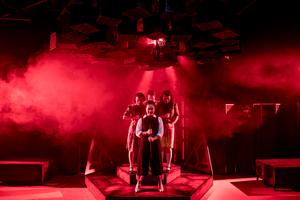Review: TOKYO ROSE, Southwark Playhouse
Burnt Lemon Theatre bring the extraordinary story of Iva Toguri to light in a wonderfully well sung musical

 Iva Toguri, daughter of Japanese immigrants, graduates UCLA with dreams of becoming a doctor, but she is sent across the Pacific by her parents to support her ailing aunt and learn a little of the country in which they were born. She feels American - not even liking rice - is an American citizen, but she cannot get back home after Pearl Harbour. She works as a bilingual typist at Radio Tokyo, but she's soon cajoled into broadcasting to the American soldiers fighting in the Pacific Theatre.
Iva Toguri, daughter of Japanese immigrants, graduates UCLA with dreams of becoming a doctor, but she is sent across the Pacific by her parents to support her ailing aunt and learn a little of the country in which they were born. She feels American - not even liking rice - is an American citizen, but she cannot get back home after Pearl Harbour. She works as a bilingual typist at Radio Tokyo, but she's soon cajoled into broadcasting to the American soldiers fighting in the Pacific Theatre.
Assisted by prisoners of war, her short scripts carefully avoid anything that obviously boosts the Japanese war effort, but, after the war, a frenzied press (the mythical seductress as strong an image as ever) seek out 'Tokyo Rose', the catch-all name given to local women who sought the attention of US soldiers over the airwaves. By 1949, the press have their 'Tokyo Rose' and Toguri is sent to San Francisco to stand trial on eight counts of treason.
It's an extraordinary tale, one to which writers, Maryhee Yoon and Cara Baldwin, needed to add little in order to create a Hamiltonesque tale of an outsider caught in the swirling waters of American history. There's more than a touch of Lin Manuel Miranda's influence on the songs too, a very 21st century score from William Patrick Harrison, insisting (were anyone to require a reminder) that citizens with heritages in other countries and cultures face problems not of their own making even today.
There are also remarkably strong parallels with PG Wodehouse's Berlin Broadcasts, also delivered at the behest of a hostile power, also done with the somewhat naive intention of raising morale of Allied soldiers, also leading to accusations in the press of treasonous behaviour. Unlike Toguri, Wodehouse, a national treasure before the term was coined, never stood trial, still less was convicted - like Toguri's words, his read as the flimsiest of grounds for prosecution, or even criticism beyond the charge of naivety. His skin was white.
Maya Britto gives us a Toguri who loves her country and, for so long, cannot understand why it treats her so, until, in her big 11 o'clock number "Crossfire", she confronts the fact that she is a pawn in a game of cheap politics and cheaper journalism. Britto sings with a West End leading lady's charisma, but even so strong as voice as hers is eclipsed by Kanako Nakano as her Japanese aunt, whose lament is as heartbreakingly sad as anything I'll hear this year. Yuki Sutton also does a standout job with Toguri's American lawyer and civil rights champion, Wayne M. Collins.
Indeed, all the cast (six women play multiple roles) have strong and versatile voices, the singing is more accomplished than in many shows with tickets four times the price and then some. So it's a strange decision to use so many songs that are sung in chorus - the harmonies are lovely to hear of course, but it's only in the second half that we get the changes in tempo and focus that a long show like this needs, and the opportunity to hear the qualities of the singers as individuals. As with many productions, one feels that there's an even more impressive two hours long show hidden within the 150 minutes version we see.
Though one should applaud a project like this getting off the ground at all - and it has received awards that do just that - it is disappointing that live musicians are not used to support the tremendous vocals. No matter what system is used (and the cast are wearing mics), it's just not the same and may play into the first half's more pedestrian feel.
At a time when hideous concepts such as 'native nationalism' are gaining ground in democracies around the world (one is reminded of Major Winchester's line in M*A*S*H, "My family have been having trouble with immigrants ever since we arrived in the United States"), the threat to people like Iva Toguri, men and women who are obliged by some to continually prove their 'loyalty', is growing. The thoughtless, foolish question "But where are you really from?" has morphed in the last ten years from an irritant into a menace. Toguri, after many years and many thwarted attempts, found her way to her true home and lived a long life in the USA - but her fight for basic acceptance is being fought in schools, in workplaces and in the media as much today as then.
Tokyo Rose is at Southwark Playhouse until 16 October and on tour.
Photo Steve Gregson
Reader Reviews

Videos

